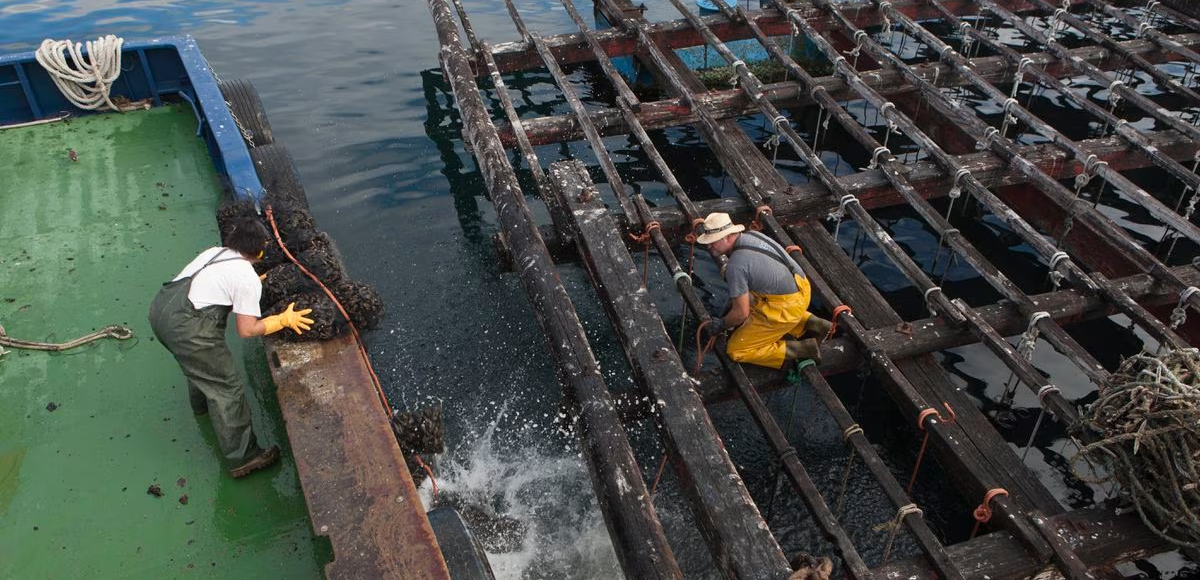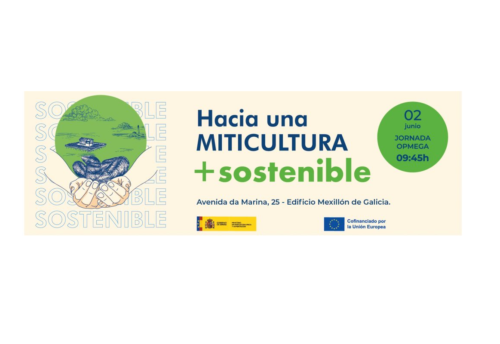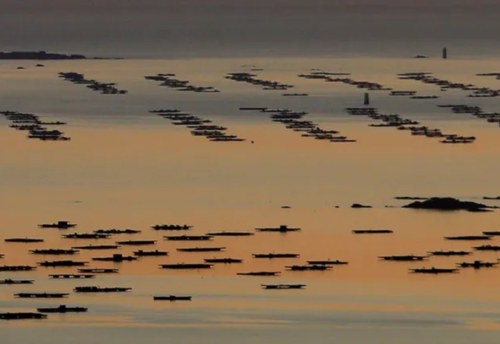
- 05/06/2023
The mussel crisis in Galicia: the sale of increasingly smaller molluscs plummets its reproduction
Biologists look for alternatives and investigate how to raise larvae in incubators. The problem has put the mussel farmers on a war footing against the Xunta and the barnacles, with whom they share cliffs.
Galicia, the leading mussel producer in Europe and third in the world, faces a serious problem: the historical fall of the spat of this mollusk, called cheek, which shellfish collectors extract from the rocks to take them to the rafts where they are allowed to grow. The crisis has its roots in a commercial model that, for two decades, has opted for selling small sizes of the bivalve. It is much more profitable but, according to biologists, it has affected the natural reproduction rate of this species, with shorter cycles to supply the market. This lack of cheek has led to a great confrontation between the mussels with the Xunta and the barnacles, another strategic sector but with less economic weight with which it shares extraction areas on the cliffs. Between these two waters of the conflict, the Galician Government is committed to dialogue to calm the upset spirits of the bateeiros due to the shortage of breeding, while the barnacles see their resources threatened and demand exclusive areas to exploit the crustacean.
The change in the production model of the mussel is the most important factor that influences the scarcity of cheek, in addition to other environmental factors such as marine currents. The commercial strategy that favors the sale of small-sized mollusks requires more cheek while the number of individuals of reproductive age is much lower. “The farming cycle is now shorter,” explains biologist Carlos Gabín, director of the Vilanova de Arousa (Pontevedra) Marine Research Center (Cima). “If the large 40-gram mussel is rafted for between 22 to 24 months until it reaches commercial size, the small one, of 20 grams, only requires between 9 and 11 months,” he stresses.
The Xunta has been working for years to find solutions and hatcheries or hatcheries are presented as the main alternatives. The Consellería do Mar has commissioned a study to evaluate different ways of getting more cheek, in which it will invest more than two million euros. It is also preparing a management plan, which it will soon propose to the sector, with which it intends to reduce dependence on its extraction in the natural environment. Its objective is to create a scientific-technical working group to address the demands of the more than 40 producer organizations, capturing more mussel larvae for hatcheries and allowing the rafts to have more and longer strings.
With a stable number of 3,300 rafts in Galicia, the statistics of recent years certify this greater commitment to the so-called small fresh mussel or lacasito. In 2022, 219,000 tons of bivalves were extracted and this size represented 68% of production and 65% of total turnover. In the 2000s, it accounted for only 45% of production and less than half of revenue. The economic weight of the large mussel has fallen. If 20 years ago it reached a third of the turnover, now it barely accounts for 10% of the total and almost 12% of the global turnover, generating 13 million euros compared to the almost 74 million for the small mussel that reigns in the market. .
The sector has focused on the ruinous situation that the lack of cheek supposes and blames the Minister Rosa Quintana for favoring the barnacles. However, the figures say otherwise. In 2022, in the midst of the cheek crisis, the bateeiros obtained the best economic results in their history, with a turnover that exceeded 150 million euros. The stability of prices has had an influence and the Xunta intends to keep it that way, “with the aim of giving value to a product of the highest quality from the Galician estuaries”.
Conflict zones
The beaten rocky areas where the barnacle grows in Galicia usually have an abundant presence of cheek and the deficient extraction of one resource can end up damaging the other. That is the origin of the disagreements that have been maintained for decades by the bateeiros and the barnacles, who accuse each other of harming their interests. The conflict has intensified in recent years due to the scarcity of cheeks and the greater presence of mussels in areas with high-quality barnacles.
In 2019, the Xunta decided to delimit areas for the extraction of the species in contention and establish some exclusive areas for the barnacle through a decree that was unsuccessfully appealed in court by the mussel farmers. Mar is clear that “a sustainable exploitation of all resources must be carried out and measures must be adopted taking into account the interests of both sectors involved”, they explain. In addition, he stresses that he has held more than 50 meetings with the two parties in the last year, and that he has made “multiple concessions to the batting sector.” Among them, he cites the extension of the extraction period, even to the whole year; raise the string current to between 100 and 150; and authorize the extraction of cheekbones on the piers of the ports.
Since February, more than 152 kilometers of coastline have been opened to cheek extraction, 120 in ports and more than 12 in natural banks, but nine barnacle guilds appealed against the measure and the award to mussels was annulled pending retake with another legal formula. The barnacles have seven exclusive areas in the province of A Coruña and another seven in Pontevedra.
For the biologist Edgar No Couto, the two sectors are compatible. “The shock arises when the best barnacle production areas, the most protected, are reserved for important campaigns such as Christmas. You have to try to achieve a balance, since there are fewer barnacles and their fixation and development on the rock is slower”, he explains. The barnacle takes two years to acquire commercial size and a rock completely scraped by the extraction of the cheek takes 3 to 4 years to be productive, underlines the researcher.
Experiment to produce larvae in incubators
More than 25 years ago, hatcheries or incubators for assisted hatching became fashionable in Galician aquaculture. Now the Marine Research Center of the Xunta (Cima), in Vilanova de Arousa, is promoting an experimental plan to produce mussel larvae in these farms and thus alleviate the shortage of cheek.
At the end of February 2022, an 80-square-meter hatchery was launched where phytoplankton is produced and wild mussel larvae from the Galician estuaries develop. 3 million units were achieved and another 14 million are now playing. “The experimental test will show the behavior of the hatchery larvae in the raft, without intervening in the process and respecting the producers who we hope will demand our collaboration and show interest in what we are doing”, emphasizes Carlos Gabín, director of the center.
The supply of mussels has always come from the marine environment, but “there is a change in habits for market reasons, which is why we are working to find alternatives to cheek production, although they will not be definitive solutions,” Gabín clarifies. Recently there have even been signs that the private sector is interested in undertaking business projects for hatcheries. “This is good news because a very competitive sector with enormous demand can emerge, so we are open to collaborating, as we are doing with the entire sector, accommodating to their means of work,” he adds.


